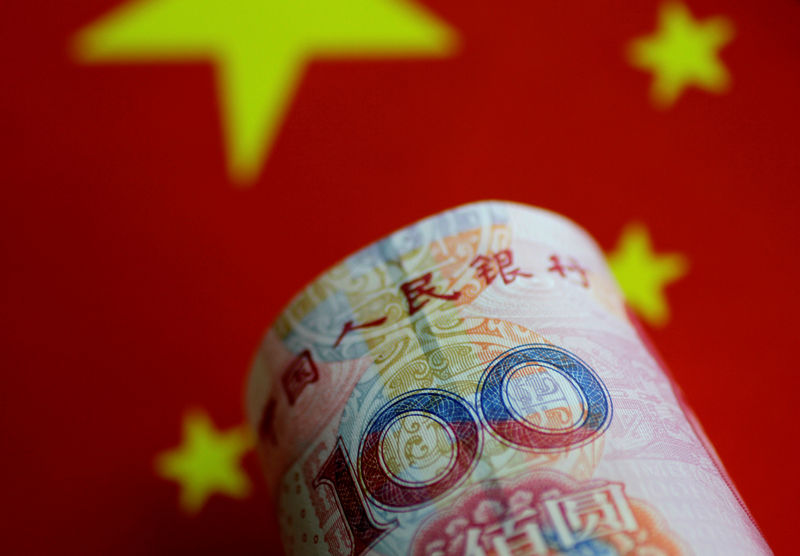By Winni Zhou and Noah Sin
SHANGHAI/HONG KONG (Reuters) - A surprising rally for China's yuan over the turn of the year has been cut short by widespread expectations that Beijing will ramp up policy easing in coming months to avert a sharper economic slowdown.
The yuan
Gains in a currency that was one of Asia's weakest in 2018 were also fueled by expectations that Beijing does not want to see the currency drop too much, in case it becomes a sticking point in negotiations with the Trump administration.
But analysts say mere optimism over trade talks cannot take it any higher, unless it's driven by a dramatic decline in the dollar. Caution over trade and the extent of further Chinese easing are likely to cap the yuan's gains.
Trade negotiators are facing an early March deadline and Washington has threatened to sharply hike tariffs on Chinese goods if there are no substantial signs of compromise from Beijing.
"If we look back, the three factors driving renminbi depreciation, including dollar appreciation, the trade war and interest rate differentials last year, only dollar appreciation has turned," said Tommy Xie, an economist at OCBC Bank in Singapore.
Uncertainties over trade, China's slowdown and policy easing would cause the yuan's yield differences with the dollar to narrow, and place it under pressure, he said.
Stefan Hofer, chief investment strategist at the Hong Kong branch of private bank LGT, expects the yuan to weaken to 6.9 in three months and then recover to 6.7 in 12 months.
Hofer said China's central bank should prioritize restoring investor confidence in its capital markets, in particular its equity markets which plunged last year. Currency stability is key to that, he says.
Analysts at Morgan Stanley (NYSE:MS) said last week that they had turned bullish on the yuan, both because the People's Bank of China (PBOC) would refrain from intervening during trade talks and as companies convert more dollars into yuan ahead of Lunar New Year payments.
The currency fell more than 5 percent in 2018, and at one point had looked set break through a decade-low of 7 per dollar.
Andy Seaman, chief investment officer at Stratton Street in London, is long the yuan, even though his fund mainly buys Chinese dollar bonds rather than the domestic ones.
He says the yuan's fundamentals do not justify its weakness and it was weak only because of the dollar's broad strength.
Authorities are also likely to want to keep the yuan stable ahead of China's debut in global bond indexes. A phased inclusion of yuan-denominated government debt in the Bloomberg Barclays (LON:BARC) Global Aggregate Index is scheduled for April.
GRAVITY DEFYING
Even yuan bulls concede its recent gains have been gravity-defying, with some China watchers saying the economy may be in the midst of a significant slowdown.
Data on Monday showed fourth-quarter economic growth cooled to 6.4 percent on-year, the weakest since the global financial crisis. That dragged full-year 2018 growth to 6.6 percent, the weakest in 28 years.
Growth is set to cool further this year, with some analysts predicting it could drop below 6 percent this spring, before support measures start to stabilize activity around mid-year.
Stuart Ritson, portfolio manager for emerging market debt at Aviva (LON:AV) Investors, noted the yuan had rallied despite obvious risks, including a decline in the current account surplus.
"I'm just not too sure as a policy tool, given the sensitivity during the trade talks, that it's possible to really allow the currency to weaken too much."
HEADWINDS
Most analysts polled by Reuters at the beginning of this year believe the yuan will weaken below 7 within six months.
Analysts say the yuan's strength gives the PBOC room to cut interest rates and pump cash into markets, a change from last year when capital outflow risks were a key concern as yields fell and the yuan was weakening.
Despite losing its yield advantage over dollar rates, outflows were moderate in 2018, with only a modest drop in FX reserves.
But falling local yields could drag on the yuan later this year. While the Fed has now hinted future rate rises may be slower, U.S. yields are still rising. Chinese three-month yields are now 11 basis points below U.S. yields, a sharp turn from being 250 points higher early in 2018.
"Even though there is no basis for yuan depreciation, there is no basis for a unilateral appreciation either," said Stephen Chiu, FX and rates strategist at China Construction Bank (Asia) in Hong Kong.
China might be willing to let the yuan fall if that depreciation was justified by fundamentals, such as unexpected weakness in the economy, Chiu said.
But China's key priority this year was to stabilize market expectations, and encouraging any yuan depreciation would be viewed as comprehensive monetary easing, he said.
